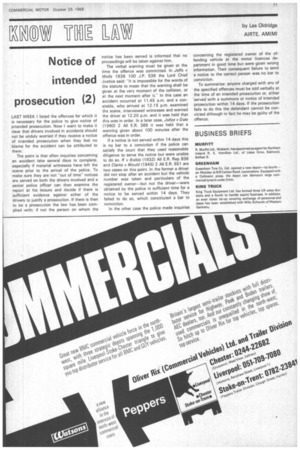Notice of intended prosecution (2)
Page 73

If you've noticed an error in this article please click here to report it so we can fix it.
LAST WEEK I listed the offences for which it is necessary for the police to give notice of intended prosecution. Now 1 want to make it clear that drivers involved in accidents should not be unduly worried if they receive a notice of intended prosecution when they feel no blame for the accident can be attributed to them.
The point is that often inquiries concerning an accident take several days to complete, especially if material witnesses have left the scene prior to the arrival of the police. To make sure they are not "out of time" notices are served on both the drivers involved and a senior police officer can then examine the report at his leisure and decide if there is sufficient evidence against either of the drivers to justify a prosecution. If there is then to be a prosecution the law has been complied with; if not the person on whom the notice has been served is informed that no proceedings will be taken against him. The verbal warning must be given at the time the offence was committed. In Jeffs v Wells 1936 100 J.P. 536 the Lord Chief Justice said: "It is impossible for the words of the statute to mean that the warning shall be given at the very moment of the collision, or at the next moment after it." In this case an accident occurred at 11,45 a.m. and a constable, who arrived at 12.15 p.m. examined the scene, interviewed witnesses and warned the driver at 12.20 p.m. and it was held that this was in order. In a later case, Jo/lye v Dale 09601 2 All E.R. 369 it was held that a warning given about 100 minutes after the offence was in order.
If a notice is not served within 14 days this is no bar to a conviction if the police can satisfy the court that they used reasonable diligence to serve the notice but were unable to do so. R v Bolkis (1932) All E.R. Rep 836 and Clarke v Mould (1945) 2 All E.R. 551 are two cases on this point. In the former a driver did not stop after an accident but the vehicle number was taken and particulars of the registered owner—but not the driver—were obtained by the police in sufficient time for a notice to be served within 14 days. They failed to do so, which constituted a bar to conviction.
In the other case the police made inquiries concerning the registered owner of the offending vehicle at the motor licences department in good time but were given wrong information. Their consequent failure to send a notice to the correct person was no bar to conviction. To summarize: anyone charged with any of the specified offences must be told verbally at the time of an intended prosecution or, either 'served with a summons or notice of intended prosecution within 14 days. If the prosecution fails to do this the defendant cannot be convicted although in fact he may be guilty of the offence.
















































































































